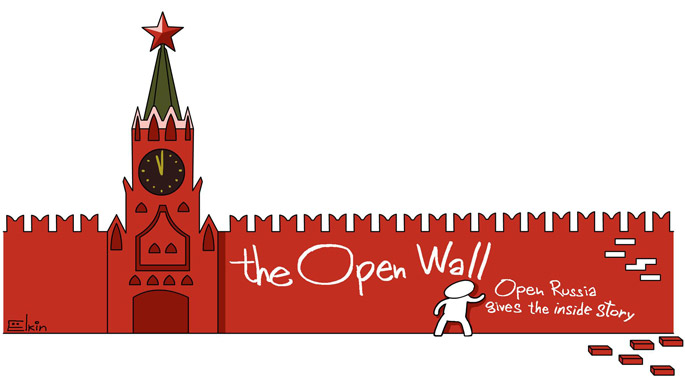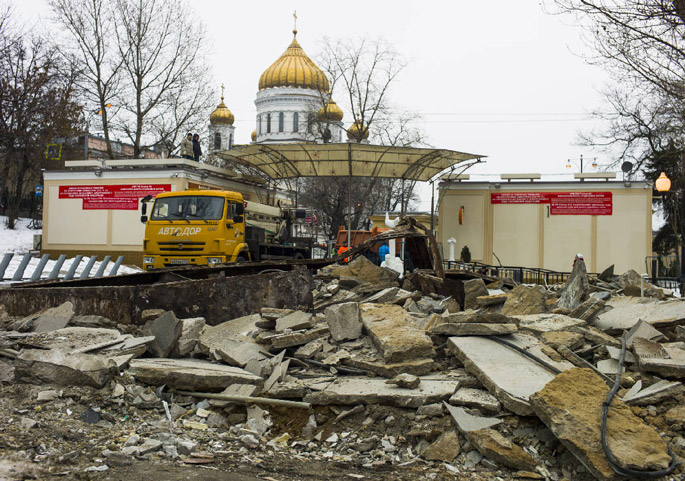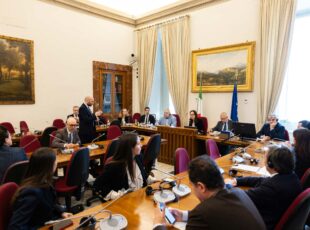“Unacceptable”

“Unacceptable”
Prime Minister Dmitry Medvedev has criticised the country’s “unacceptable” 170th place ranking for cross-border trade in a World Bank Group report. But what did he expect?

Sergey Orlov
At the end of June it emerged that the Moscow mayor’s office was preparing to demolish a further 107 buildings and structures without recourse to court proceedings, because, in the opinion of officials, they were erected without proper legal authorisation. This will be the second wave of demolitions – the first was during the night of 8 February 2016, when 97 structures, mostly shops, cafes and small commercial centres, fell victim to the wrecking ball. This new mayoral initiative was greeted without enthusiasm by Runet [Russian Internet] users:
“This is nothing new – the FSB destroys businesses at the highest level, the cops take out the middle level and the local authorities do the rest.”
“At least the Bolsheviks didn’t destroy ownership – they just nationalised it.”
The authorities took no account of court rulings on the legality of the structures in question, either in February or now. They hid behind references to new amendments to the Civil Code allowing – in some cases – local authorities to demolish so-called unauthorised constructions without having to bother with any legal red tape. The new Civil Code, which effectively deprives legal owners of any judicial protection, has already been challenged in the Constitutional Court. But the mayor’s office does not appear to think it necessary to wait for constitutional and/or legal evaluations, and is gearing up to deal with a hundred structures in one day.
When the owners tried to contest the mayoral decision in the Moscow City Court, they were told that all earlier court judgements in their favour were worthless, which outraged many lawyers. Moscow barrister Yevgeny Korchago wrote: “How is it that a Court of Arbitration judgement (which has not been quashed) recognising a property as legitimate can become no more than a piece of paper for another judge?”
Moscow mayor Sergei Sobyanin also reflected on pieces of paper in the context of the “Long Night of the Wrecking Balls” (which is how the journalists have christened the mayor’s special operation in February), alleging that the title deeds had “obviously been acquired dishonestly.” Exactly who will establish that this was so obvious, when the court has no authority, is not quite clear, but perhaps Sobyanin can make these assessments by eye.
Moscow city’s way of dealing with property ownership has apparently inspired the Moscow regional government. They have come up with a draft law, which has been sent to the Construction Ministry, permitting the seizure without a court order of an unfinished building that has been under construction for too long. The authors of the draft law asserted that they were motivated solely by a desire to protect the interests of investors, but, as RBK newspaper wrote, it is the local authorities that will “acquire the right to hold a tender for the completion of the building, or its sale to a new developer.” Experts are sounding the alarm, because the Moscow regional government’s proposed law, if passed, will afford corporate raiders new opportunities, and problem construction projects could start being taken over by organisations affiliated to the government.
A reader of the business newspaper Vedomosti put it well: “What need do we have of courts in a country governed by such amazingly wise blokes? The judiciary should be dismantled as a harmful Anglo-Saxon invention.”
The global approach adopted by Moscow regional officials is unknown in the provinces. There it’s all much simpler: the police, tax authorities, prosecutors and judges join forces to put a property owner behind bars, where he will stay until he hands over part or all of his business to “the right people.”
In Moscow, everything is on a bigger scale, of course, with properties worth billions of dollars in the firing line. The owner of Domodedovo Airport, for instance, Dmitry Kamenshchik, failed to understand signals from the law enforcers and refused to give them a share in the airport. He has been under investigation for over four months. Eighteen months ago the owner of AFK Systema, Yevgeny Yevtushenko, got the message: he handed over his company Bashneft to the state and avoided any criminal charges.
Some examples of regional practices can be found on the site of the Business Ombudsman, Boris Titov. In the Krasnodar region, the law enforcers brought charges against a businessman, and then confiscated all the property of his legal entity, thus completely paralysing the company. In Tver region, a company director was accused of embezzlement and put into pre-trial detention. This was so the local authority would not have to pay his private construction company many millions for work it had carried out. In Kaliningrad region, the taxmen accepted what were clearly forged documents from a corporate raider, re-registered the company in the name of the imposters and ignored all demands from the legal owner to carry out additional checks.
Of course, Putin knows very well what the system he has constructed is capable of: “In 2014, 15% of cases dealing with economic crimes ended in a guilty verdict. That said, approximately 80%, possibly even 83%, of businessmen lost their businesses, either totally or partially i.e. they were pressurised, made to pay through the nose, and then released.” But what has he done to improve that situation? Nothing. So it’s hardly surprising that foreign investors are voting with their feet; and that, Mr Medvedev, really is “unacceptable.”



